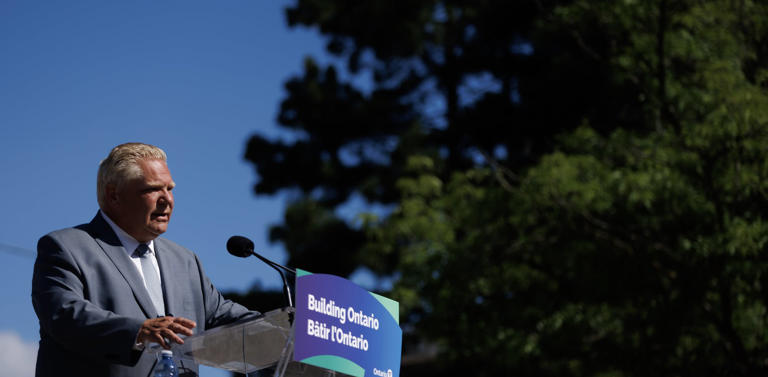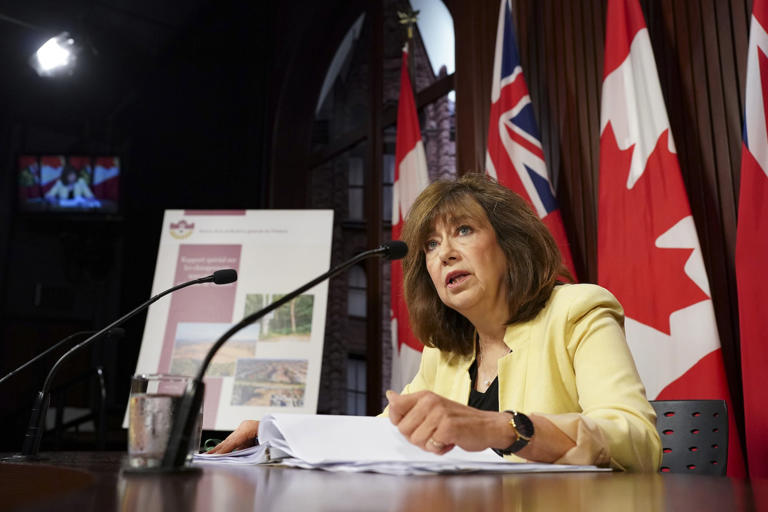Story by Mark Winfield, Professor, Environmental and Urban Change, York University, Canada
THE CONVERSATION

Ontario Premier Doug Ford speaks during a news conference in Mississauga, Ont., on Aug. 11, 2023, two days after a scathing auditor general report into the Greenbelt.
The findings of Ontario’s auditor general on the provincial government’s decision to remove 7,400 acres from the Greater Toronto Area Greenbelt came as no surprise to those who have been closely following Premier Doug Ford’s approach to planning and development.
Auditor General Bonnie Lysyk determined:
— Well-connected developers were given direct access to ministerial staff and the opportunity to rewrite planning rules to suit their own interests;
— Normal decision-making processes and planning rules were bypassed;
— Overwhelming evidence that indicated there was no need to remove land from the Greenbelt to meet the region’s housing needs was ignored;
— Decisions were made to provide billions of dollars in benefits to private interests that won’t enhance housing affordability in any way.
All of this is part of a wider pattern of behaviour for the Ford government over the past five years.

Ontario Auditor General Bonnie Lysyk speaks to the media during a news conference regarding her report on the Greenbelt on Aug. 9, 2023.© THE CANADIAN PRESS/Arlyn McAdorey
Par for the course
The Greenbelt controversy is the culmination of a series of troubling government decisions and legislative changes since Ford was first elected in 2018.
These have included the widespread use of ministerial zoning orders, known as MZOs, to override local plans and city council decisions in favour of development interests.
In addition, developers have been invited to rewrite the planning rules — all mandated by municipalities and communities to facilitate and manage urban growth via existing provincial policies — to suit their own interests.
There are examples throughout Toronto and its bedroom communities — including in midtown and downtown Toronto, Richmond Hill, Markham and Mississauga.
The roles of conservation authorities and local governments in decision-making have been systemically marginalized, and planning rules related to both built and natural heritage conservation sites have been shredded.
Meantime, the costs of the infrastructure needed to support private, for-profit development have been transferred to local and provincial taxpayers.
The province’s land-use planning system — including the Greenbelt and growth plans for the Greater Toronto Area — were once the subject of international acclaim for their management of intense growth while farmland, housing affordability and natural heritage areas were protected.
Now that system has been transformed into an instrument wielded by the province to overcome any objections to the wishes of developers.
Policy failure
The result has been a predictable picture of policy failure — a development boom defined by the construction of single-use high-rises, mostly condominiums, in urban areas and sprawling low-density housing in the suburbs.
That trend has been escalated by the removal of the 7,400 acres from the Greenbelt.
This model of “tall and sprawl” development has done next to nothing to improve housing affordability, particularly for those at the lower end of the income scale.
In fact, in some areas, this industry-driven model is leading to significant losses of existing affordable rental housing as they’re displaced by investor-owned condominium developments.
The same basic principles evident in the government’s handling of the Greenbelt and housing files can be seen across a range of files, from energy to health care.
The Ford government engages in a casual approach to decision-making that regards normal governance processes as delay-inducing red tape. It tends to respond uncritically to whatever its favoured economic interests tell it to do.
That tendency was highlighted in Ford’s recent Greenbelt news conference, when he seemed to define good governance as saying “yes” to whatever business lobbyists ask for.
Perhaps even more disturbing is his apparent blindness to the meaning of ministerial responsibility or accountability in a system of democratic governance. Both Ford and Housing Minister Steve Clark claim they didn’t know what the minister’s chief of staff was doing on the Greenbelt file.
Those claims are either admissions of catastrophic failures in management and oversight or an attempt to mislead the legislature, the auditor general and the public.
Stonewalling
So far, the government has stonewalled on the auditor general’s key recommendation — that the removal of lands from the Greenbelt must be re-evaluated in light of what the government itself admits was a flawed decision-making process.
But the political and legal fallout from the auditor general’s report seems destined to continue for some time.
A further report into the controversy from the Ontario legislature’s Integrity Commissioner is on the horizon.
Lysyk has already committed to a followup audit. There are also calls for an Ontario Provincial Police investigation into the Greenbelt decisions. A variety of potential procedural and legal challenges are under consideration.
Whether the entire episode will prompt the government to reconsider its evidence-free, friends-with-benefits approach to governing remains an open question. So does the question of whether the political and legal fallout will be substantial enough to mark the beginning of the end for Ford’s government.
This article is republished from The Conversation, a nonprofit news site dedicated to sharing ideas from academic experts.
Read more:
How Airbnb may be fuelling gentrification: A case study in Toronto
Housing is a direct federal responsibility, contrary to what Trudeau said. Here’s how his government can do better.
Mark Winfield receives funding from the Social Sciences and Humanities Research Council of Canada. He was involved in the development of the original GTA Greenbelt and Growth Plans, including serving on the Ministerial Advisory Committee on the Implementation of the Growth Plan.
Wed, August 16, 2023
Ford claims he needs to decimate the protected Greenbelt in Ontario to address the housing crisis, but both experts and the Auditor General says that's B.S.
On Canada Project is a social advocacy group made up of neighbourhood nerds who are here to dismantle the status quo and champion change in our lives.
—
The Greenbelt is a protected area of Ontario that serves a critical purpose in protecting our planet.
Ontario Premier Doug Ford claims he needs to decimate the Greenbelt to address the housing crisis, however both experts and the Auditor General says that's not true.
Earlier this year, Ford came under fire for having developers at his daughter's wedding festivities - and those same developers are the ones making money off of the destruction of the Greenbelt.
He made this video because during his 2018 campaign, it leaked that Ford had told developers 'he has their back' regarding Greenbelt.
$8.3 billion dollars of taxpayer money is not only going towards the destruction of something that helps us combat the climate emergency, but it's public dollars going to Ford's friends.
That's corruption – we have the receipts and explain why.

















